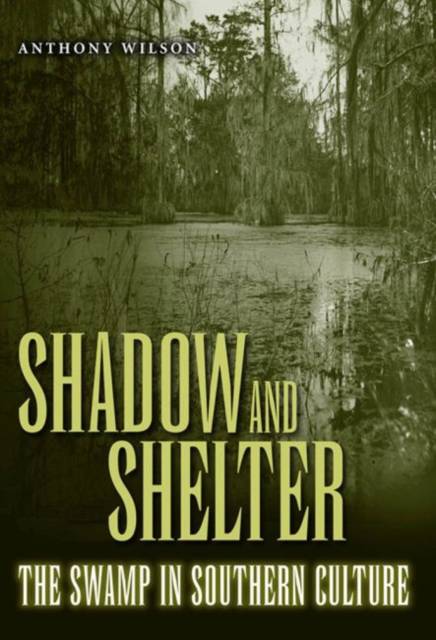
Bedankt voor het vertrouwen het afgelopen jaar! Om jou te bedanken bieden we GRATIS verzending (in België) aan op alles gedurende de hele maand januari.
- Afhalen na 1 uur in een winkel met voorraad
- In januari gratis thuislevering in België
- Ruim aanbod met 7 miljoen producten
Bedankt voor het vertrouwen het afgelopen jaar! Om jou te bedanken bieden we GRATIS verzending (in België) aan op alles gedurende de hele maand januari.
- Afhalen na 1 uur in een winkel met voorraad
- In januari gratis thuislevering in België
- Ruim aanbod met 7 miljoen producten
Zoeken
Omschrijving
Shadow and Shelter: The Swamp in Southern Culture by Anthony Wilson An examination of the swamp's role in southern cultural, literary, and ecological history. In Shadow and Shelter: The Swamp in Southern Culture, Anthony Wilson examines the relationship between the ecological history of the southern swamp and the evolution of southern culture from the colonial era to the present. To early European colonists, the swamp was a place linked with sin and impurity. To the plantation elite, it was a practical obstacle to agricultural development. For the many excluded from the white southern aristocracy-African Americans, Native Americans, Acadians, and poor, rural whites-the swamp meant something very different, providing shelter and sustenance and offering separation and protection from the dominant plantation culture. This book explores the interplay of contradictory but equally prevailing metaphors: first, the swamp as the underside of the myth of pastoral Eden that defined the antebellum South; and second, the swamp as the last pure vestige of undominated southern wilderness. As the South gives in to strip malls and suburban sprawl, its wooded wetlands have come to embody the last part of the region resisting assimilation. Shadow and Shelter charts this transformation as reflected in literary works as varied as William Byrd II's History of the Dividing Line and Linda Hogan's Power, as well as in films, legislation, personal memoirs, and the tourist industry. Examining the southern swamp from a perspective informed by ecocriticism, literary studies, and ecological history, Shadow and Shelter considers the many representations of the swamp and its evolving role in an increasingly multicultural South. Anthony Wilson is assistant professor of English at LaGrange College.
Specificaties
Betrokkenen
- Auteur(s):
- Uitgeverij:
Inhoud
- Aantal bladzijden:
- 208
- Taal:
- Engels
Eigenschappen
- Productcode (EAN):
- 9781604733860
- Verschijningsdatum:
- 6/12/2005
- Uitvoering:
- Paperback
- Formaat:
- Trade paperback (VS)
- Afmetingen:
- 152 mm x 229 mm
- Gewicht:
- 349 g

Alleen bij Standaard Boekhandel
+ 118 punten op je klantenkaart van Standaard Boekhandel
Beoordelingen
We publiceren alleen reviews die voldoen aan de voorwaarden voor reviews. Bekijk onze voorwaarden voor reviews.









